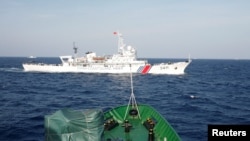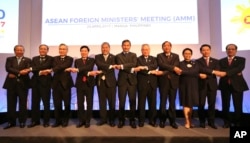China and the Association of Southeast Asian Nations (ASEAN) have agreed to a framework for a code of conduct in the South China Sea, a development that could ease tensions in the disputed waters.
China's foreign ministry said senior officials from ASEAN and China agreed to the framework that establishes guidelines for a final agreement. The terms were reached at a meeting in the southwestern province of Guizhou.
China claims ownership of nearly all of the South China Sea, believed to be the source of vast oil and gas deposits, despite partial counterclaims from Taiwan and several ASEAN members. The dispute has created divisions among ASEAN members that usually try to operate by consensus.
The issue escalated in recent years as China followed a strategy of constructing artificial islands in the sea that can support regional military facilities. The strategy has provoked intense reaction from other claimants and the U.S., which argues China's actions threaten the ability to navigate freely through the strategically important area.
A draft of the framework describes the projected agreement as "a set of norms to guide the conduct of parties and promote maritime cooperation in the South China Sea," adding it is "not an instrument to settle territorial disputes."
ASEAN and China adopted a non-binding declaration in 2002 not to use threats or force to assert claims to the territory. But China refused to honor the declaration as legally binding, and instead used the intervening time to build artificial islands.
Former Philippines president Benigno Aquino had taken a firm position against China's claims, but relations between the two countries have warmed considerably since last year's election of President Rodrigo Duterte, who has declined to confront China on the issue with the hope of being rewarded with aid and investment.
Chinese and Philippine officials will hold their first round of bilateral talks on their part of the dispute in China on Friday.
Duterte said on Thursday he would be willing to explore the South China Sea's natural resources along with rival claimants China and Vietnam.










